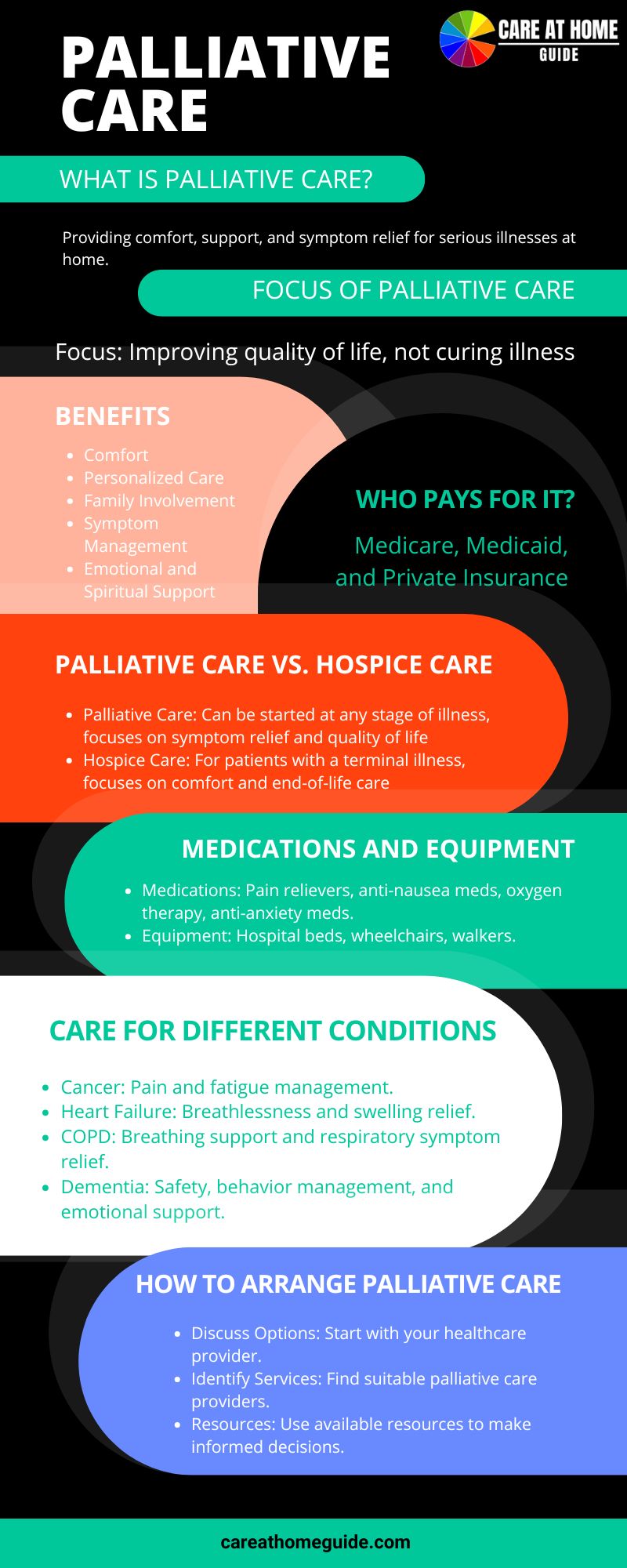
Palliative Care at Home: Benefits, Costs, and Everything You Need to Know
Palliative care at home focuses on providing comfort, support, and relief from the symptoms of serious illnesses, allowing patients to stay in their own homes while receiving care. This type of care is available to individuals suffering from conditions such as cancer, heart failure, COPD, and dementia. It is designed to improve the quality of life for both patients and their families by addressing physical, emotional, and psychological needs.

What to Expect from In-Home Palliative Care
When arranging in-home palliative care, families can expect a tailored care plan designed to meet the unique needs of the patient. The palliative care team—comprised of doctors, nurses, social workers, and spiritual advisors—works collaboratively to manage symptoms such as pain, shortness of breath, fatigue, and depression. The goal is to enhance the patient’s comfort and well-being, regardless of the stage of their illness.
In-home care includes routine visits from healthcare providers, pain and symptom management, emotional support, and help with daily activities. Families can also expect regular updates on the patient’s condition, allowing for adjustments to the care plan as needed.
Benefits of Home Palliative Care
Choosing home palliative care offers several benefits:
- Comfort: Patients remain in familiar surroundings, which can reduce anxiety and improve mental health.
- Personalized care: Care plans are adjusted to the individual’s specific condition and changing needs.
- Family involvement: Family members can take an active role in caregiving, with the support of a professional team.
- Symptom management: The care team focuses on controlling pain, nausea, shortness of breath, and other symptoms to improve comfort.
- Emotional and spiritual support: In addition to medical care, the palliative team provides emotional and spiritual support, which is especially important during the end-of-life stage.
Who Pays for Hospice Care at Home?
One common question when considering home care is, “Who pays for hospice care at home?” For eligible patients, Medicare, Medicaid, and most private insurance plans cover hospice care, including palliative care services at home. Hospice care focuses on comfort rather than curative treatment and is typically offered to those with a prognosis of six months or less. Palliative care may be covered by Medicare Part B, depending on the patient’s specific needs, but coverage can vary.
It is essential to work with your healthcare provider and insurance company to understand what is covered under your plan and what costs might fall to the family. Additional expenses, such as personal care assistance or special medical equipment, may not always be included in insurance coverage.
Palliative Care vs. Hospice Care
While both palliative care and hospice care aim to provide comfort, they are not the same. Palliative care can be initiated at any stage of a serious illness and focuses on symptom relief and improving quality of life. Hospice care, on the other hand, is typically provided when curative treatments are no longer an option and the focus shifts entirely to comfort and end-of-life care.
For families taking care of elderly parents at home, understanding the difference between the two is crucial for determining the right type of care at different stages of illness.
Palliative Care Medications and Equipment
When receiving palliative care at home, patients may need access to specialized medications and medical equipment to manage symptoms effectively. The care team will ensure that all necessary supplies, such as pain relievers, oxygen, and mobility aids, are provided to ensure the patient’s comfort.
Palliative care medications at home can include:
- Pain relievers (opioids, NSAIDs)
- Anti-nausea medications
- Oxygen therapy for breathing difficulties
- Anti-anxiety medications
In addition to medications, equipment such as hospital beds, wheelchairs, and walkers may be provided to assist with mobility and daily care.
In-Home Palliative Care for Different Conditions
In-home palliative care is available for various serious illnesses, each with unique challenges and symptom management needs:
- For cancer patients, it focuses on managing pain, fatigue, and side effects from treatment.
- For heart failure patients, it aims to relieve breathlessness, fatigue, and swelling while helping with diet and exercise management.
- For COPD patients, it provides breathing support, oxygen therapy, and relief from respiratory symptoms.
- For dementia patients, it emphasizes safety, behavior management, and emotional support, helping families cope with cognitive decline.
The palliative care team adjusts treatments and support according to the patient’s condition and goals, ensuring a holistic approach to care.
Palliative Care for Veterans and Children
Specialized palliative care services are also available for veterans and children. Palliative care at home for veterans often includes addressing unique physical, emotional, and psychological needs related to military service. For children, palliative care focuses on developmental considerations, symptom management, and providing support to the family as they navigate the complexities of serious childhood illnesses.
How to Arrange Palliative Care at Home
If you are considering palliative care at home for yourself or a loved one, start by discussing options with your healthcare provider. They can help you identify the appropriate care services and assist with finding palliative care providers in your area. Understanding the available resources will help you make an informed decision about the best approach to comfort care.
Conclusion: Improving Quality of Life with Home Palliative Care
Home palliative care is a compassionate approach that enhances the quality of life for patients facing serious illnesses. With a focus on comfort, symptom management, and emotional support, this care option allows patients to stay at home while receiving necessary medical care. Whether helping with pain management or providing emotional and spiritual guidance, palliative care brings comfort to patients and their families during difficult times.
Understanding what to expect from palliative care services at home helps families make informed decisions. They can access the support needed to care for their loved ones in the most comfortable setting possible.
Resources:
- Palliative Care at Home: What to Expect for Your Loved One – Notre Dame Health Care
- Palliative vs. Hospice Care – Frequently Asked Questions – Get Palliative Care
- What is Hospice Care at Home? Services, Payment, and What to Expect – A Place for Mom
- Use of the Preparedness for Caregiving Scale in Palliative Care: A Rasch Evaluation Study – Journal of Pain and Symptom Management
- End of Life Care Services – Homewatch CareGivers
